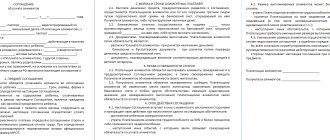image from thenounproject.co
During a divorce, former spouses often cannot resolve relations peacefully, which ultimately negatively affects their common children. Some fathers refuse to support their minor children; in this situation, women think about how to get alimony after a divorce.
The laws of the Russian Federation provide mechanisms to resolve this issue in the most acceptable manner. Our article describes in detail how alimony is issued and what is required for this.
Who should pay child support?
According to the current laws of the Family Code of the Russian Federation, alimony is required to be paid by a parent who refuses to help his child on a voluntary basis. This term refers to payments that should be allocated for the maintenance of children until they reach adulthood. A prerequisite is the separation of the child and the parent in whose favor the collection process is directed.
Important
After the court decision comes into force, the parent will be required to transfer 1/4 of his permanent income or other type of earnings to the child’s guardian’s account every month. In the absence of a regular salary, a fixed amount of payments is established.
The question of how to obtain alimony most often concerns women who were unable to reach an agreement with their ex-husbands regarding the maintenance of one or more children. If the parents have not concluded a peace agreement, one of them has the right to go to court, where a decision will be made to recover funds from the father or mother. According to the code, the following should receive alimony:
- children who have not yet turned 18 years of age if their parents have refused to support them;
- adult children who are not able to work.
Each group of persons can receive funds in the manner specified in the legislation. However, the specifics of recovery will vary depending on the specific case and specific situation.
How to apply for alimony without divorce
There are two ways to obtain alimony through the court. If everything is clear with the father’s income and there is no need to prove anything, you can apply for a court order. To do this, it is enough to provide the court with the passport of the parent who is applying for payment and the birth certificates of the children.
The court order is issued quickly; you can receive the document in your hands on the same day of application. You need to go with him to the executive service and write an application for the collection of alimony. After this, bailiffs begin their work, who every month will withdraw the amount established by the court from the father’s salary and transfer it to the mother’s account.
If the income of a negligent parent needs to be confirmed or proven that over the past years he has not participated in the maintenance of children, it is necessary to file a claim. In this case, other documents will be required:
- mother's passport;
- birth certificates of all children;
- information about the defendant father (place of work, details of his bank accounts, cards);
- confirmation of sources of income.
“In court, you need to prove that a person has income,” notes lawyer Ruzanna Khanamiryan. “And to do this, you can request information about accounts and the movement of money through them through the court.”
It is important to understand that discovering the income of the defaulter is the task of the injured party. Therefore, it would not be superfluous to go to your spouse’s work and ask the accounting department for a certificate of income. It is possible that he provided completely the wrong paper for the court. It’s worth talking to your boss and explaining that the employee doesn’t want to take part in the children’s lives. It is unlikely that the team will praise you for this; perhaps the intervention of management will be enough to finally see alimony payments.
Design options
When it becomes necessary to file for alimony for an ex-husband or wife, the procedure for filing it depends on the personal relationship between the divorced spouses. The problem can be solved voluntarily if the spouses have the opportunity to agree. If there is no peaceful outcome, it is best to go to court, where a fair decision will be made. The simplest option is to draw up an alimony agreement.
When drawing up the document, the parties independently establish the procedure and conditions for payments, as well as the amount of alimony funds. Each clause of the agreement is stated in writing, and the document itself must be certified by a notary.
This method allows you to avoid possible problems, both for the former spouses and for the child. The agreement is concluded between parents, one of whom is obliged to pay money, and the other has the right to receive it. Without notarization, the document will have no legal force. If the obligations under the agreement are not fulfilled by one party, the other has the right to go to court to recover funds.
Is it possible to recover alimony from a man if he disputes paternity?
As mentioned earlier, in the application for withholding alimony, it is necessary to simultaneously state requirements for confirmation of relationship.
The law does not prohibit sending two separate applications - to establish paternity and to withhold alimony payments. But this makes no sense - the court will accept the claims and consider them separately, but maintaining consistency. This will lead to a waste of time - the child support claim will be considered later, and the baby needs to be fed every day.
In addition, these claims will be considered by different courts. Applications for confirmation of kinship are considered in the district courts at the place of residence of the defendant. Alimony claims are considered by magistrates' courts located at the place of residence of the mother and child.
Sample statement of claim to establish paternity
Sample statement of claim to establish paternity and collect alimony
Judicial order
image from thenounproject.co
When parents cannot agree with each other, one of them can recover money from the other in the manner established by a court decision. This problem is especially relevant for women who do not know how to obtain alimony from their ex-husband. There are two types of judicial procedure as it can be summary or ordinary. In the first case, a parent who has ceased to fulfill his duties receives a court order if his place of work and residence was known and established in advance.
The second method is suitable for more complex situations if each parent has his own opinion, which he wants to convey to the judge. In a voluntary settlement of the conflict, both parties can choose the form of child support that is most convenient for each. When resolving the issue in court, there are only three ways to pay the funds that must be credited to the recipient's account every month.
A case from judicial practice
There is a large amount of practical evidence of the decisive role of genetic testing. An example is the appeal ruling of the Supreme Court of Bashkortostan in case 33-7147/2017, adopted on April 5, 2020. During the investigation, an examination was carried out to establish paternity. The defendant requested a re-examination but was denied. An attempt to appeal the decision, according to which he was recognized as the father and paid child support, was unsuccessful.
Judicial practice is based on the high reliability of DNA research, since its accuracy is 99%.
Rules for filing a claim in court
When ex-spouses cannot reach an understanding, child support payments will be made after the court decision is announced. In order for a woman to recover money from her ex-husband, she will need to file an application with the magistrate’s court located at the place of residence of one of the spouses. To proceed with the case in court, you will need to provide a package of documents:
- Certificate confirming the birth of the child.
- A copy of your passport.
- Certificate confirming the fact of divorce.
- A certificate of family composition received from the management company at the defendant’s address.
- Completed application.
If all the information is available from the parents, it will be enough to provide the court with an application asking to issue a court order. This option is considered a simplified procedure, since the other party will not be present in the courtroom. But payments will be assigned in certain proportions of the debtor’s earnings. Often you have to figure out how to get child support when his parent is hiding and evading payments.
If his residential address cannot be determined and the defendant’s source of income remains unknown, it is worth filing a statement of claim on the basis of which the debt can be collected. Some fathers may not recognize paternity, as well as the need to support children under the age of majority. In particularly difficult situations, you have to turn to qualified lawyers who can clearly substantiate the plaintiff’s position.
List of documents for alimony
Like any judicial procedure, an appeal to collect alimony from a negligent spouse has documentary support. You will have to collect a lot of papers in order for the court to make a positive decision when considering the application. Required:
- passport;
- a document confirming incapacity for work (if alimony payments are collected for one of the needy parents);
- child's birth certificate. The latter is necessary if the baby is under three years old and the mother is on maternity leave;
- order in advance a certificate of the place of registration of the child and mother;
- a certificate from the antenatal clinic (hospital), if payments are needed for a pregnant woman;
- marriage document;
- a statement in the form of a claim that the wife (husband) needs payment of maintenance and is not able to feed the child alone.
Sample claim for alimony without divorce
- The statement must provide evidence that the respondent parent is negligent in his responsibilities in terms of financial support for the child and the family as a whole. Do not forget to briefly explain the essence of the appeal and enter a specific requirement for the collection of alimony payments.
- If you need to recover money for a child and a woman, then you should file a claim for each claim separately. In one lawsuit, the child himself will be the plaintiff. Another claim identifies a spouse who needs financial support. We definitely mention that the other half, acting as the defendant, does not want to pay alimony.
Need to know! There is no state fee for filing a claim.
Payments in a civil marriage
image from thenounproject.co
Parents who do not want to legalize the relationship want to know how child support is paid for a child born in a civil marriage. It is worth keeping in mind that a child born in such a marriage also has the right to alimony, which is protected by law. Payments can be collected in the standard manner if paternity is confirmed. It is recognized at the birth of a child if information about the father is included in his certificate.
Even if the former spouses have not formalized the relationship, they are obliged to take care of their common children and provide for them until the age of eighteen. The rules for establishing alimony in this situation are carried out voluntarily or after filing a claim in court.
Sometimes a common-law husband does not want to recognize a common child and support him until he comes of age. In this case, paternity has to be proven in court. When a former spouse is unable or unwilling to admit paternity, the mother will need to provide credible evidence to the judge. The arguments for this must be truly plausible; most often in such cases, DNA testing is carried out.
Payment amounts
Parents who do not want to draw up an agreement on the amount of alimony can count on the amount being calculated taking into account the rules specified in Art. 81 IC RF. Women who want to know how to obtain alimony from the child's father need to remember that the court will collect monthly payments from him. Their amount is calculated as a percentage of the defendant’s total income and depends on the number of children. The parent will pay:
- for one child – up to 25%;
- for two children – up to 33.33%;
- for three children or more – up to 50%.
If the father or mother obligated to pay child support by court decision does not have a permanent income, or the income is not fixed, in this case the calculation of payments will be different. The court may decide and assign a fixed amount of alimony or indicate shares of payments for each month. In general, payments are calculated taking into account the minimum wage of the defendant’s region of residence, as well as the cost of living per child.
What is the amount of alimony from a husband according to the law?
The amount of alimony is prescribed in Article 81 of the Family Code. Alimony from the husband is collected in the amount of ¼ of the income for one child; 1/3 for two children and ½ if there are three or more children. The court may reduce or increase this amount taking into account the financial situation of one or another party.
When collecting alimony from a husband in the order of writ proceedings, you need to submit an application with a request to issue a court order, in essence, to the magistrate's court, which is required by paragraph 1 of part 1 of Article 23 of the Civil Procedure Code of the Russian Federation.
The requirements for the content of such a statement are listed in Part 2 of Article 124 23 of the Civil Procedure Code.
Based on an accepted application, the magistrate issues a court order within 5 days without any trial or invitation of the parties.
The court order as an executive document is transferred to the bailiffs for execution.
If the debtor submits objections to the magistrate court within 10 days, the court will cancel the order. Then, to collect alimony from the husband, you will need to write a statement of claim.
Charging options
image from thenounproject.co
After determining the amount of child support, both parents can agree on how the payer will transfer funds to the recipient's account. The method of crediting money can be any, for example, to a bank account or a bank card. Such options are relevant in cases where alimony is deducted from an employee’s salary through accounting.
The payer may be an entrepreneur or contribute funds from income received in other ways. In such situations, alimony is paid in cash or sent by postal order. Such payment cannot be confirmed through the bank, for this reason it is necessary to save all receipts for receipt of funds. You also need to keep in mind that expenses when sending money are not deducted from the total alimony amount, since they are borne by the payer.
Alimony for “black wages”
When it comes to how to arrange child support, you need to take into account situations where the father is not employed and earns his living by doing odd jobs. This also applies to parents who receive a salary “in an envelope.” In this situation, the court will set the amount of payments in hard cash, after which they will be paid by the debtor every month.
This amount is equal to the cost of living per child, depending on the region of his residence. The minimum is determined by government decree on a quarterly basis; if it is not available in the region, the size accepted for Russia as a whole is taken as a basis. Sometimes the debtor cannot pay the alimony debt, in this case the bailiffs seize his property with subsequent sale to pay off the debt.
Voluntary collection of alimony from a common-law husband.
The best option for collecting alimony, as in the case of a legal husband, is considered to be the conclusion of an agreement on alimony payments, certified by a notary office. Thanks to this, lengthy litigation can be avoided.
When concluding an agreement, parents independently indicate the amount of payments for the child. The notary is also obliged to check that the amount of alimony is not lower than that established in court. If you choose the share method for determining the monetary value, then you need to use the system established by the RF IC:
- One child – 25% of the father’s income;
- Two children – 33-35% of income;
- Three or more children – 50%.
If the common-law husband has a child from another marriage, then alimony will be divided equally among all children.
You can also agree on a monthly fixed amount or a one-time transfer of real estate in the name of the child. This method is chosen when the paying parent (in this case the father) does not have an official salary or other income. You can find out the types of income from which alimony is charged by following this link. If necessary, you can choose a mixed payment method.
The document must be drawn up in writing, certified by a notary. The alimony agreement is equal in force to the executive documents under which the forced collection of alimony arrears occurs.
Collection methods for evading payments
Unfortunately, many fathers prefer to avoid paying child support in favor of their children who have not reached the age of majority. Then the mother is faced with the acute question of how to file for child support for the father of her child. Debt collection is carried out within the framework of the rules contained in the Family Code, as well as taking into account the legislation on enforcement proceedings. To collect funds you will need:
- Contact the bailiffs, providing them with a writ of execution or agreement.
- Send the payer a resolution to open a case, in which it will be proposed to voluntarily pay the debt.
- Deliver the writ of execution to the defendant's employer. In this case, the amount of debt will be withheld by the accounting department from the debtor’s salary.
- Take enforcement measures, including seizure of real estate with its subsequent sale.
- Restrict the debtor's right to travel abroad.
- Initiate a criminal case; this measure is extreme and is carried out within the framework of Art. 157 of the Criminal Code of the Russian Federation.
In situations where the problem cannot be solved with the help of bailiffs, it is worth contacting the judicial authorities in order to collect the debt. According to Article 115, the debtor may be charged a penalty in the amount of 0.5% of the total debt daily.
Collecting alimony is considered a difficult task, especially in situations where the matter comes to court. However, most often the problem can be resolved in favor of children who receive legal payments in the prescribed manner.









